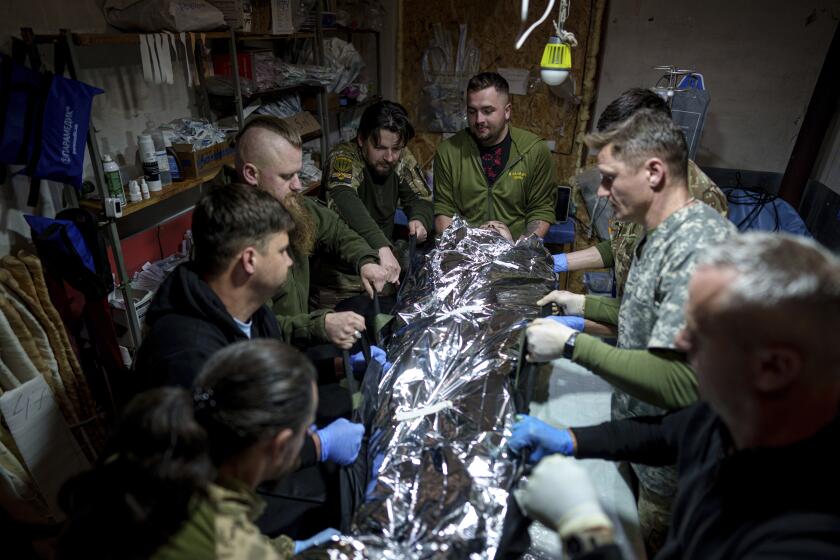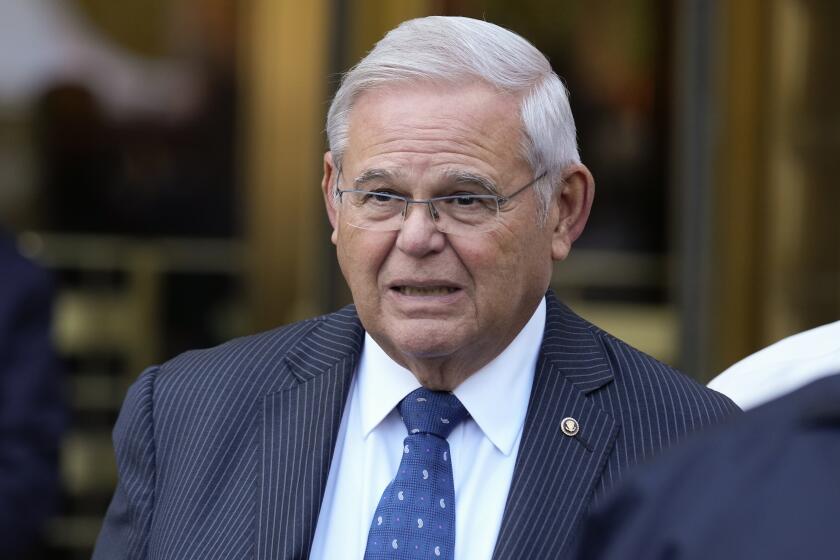$1-Million Price Tag Keeps Transplant Patient in Limbo
Robert Jaunsen would do anything for a chance to save his daughter’s life -- only he needs $1 million to do it.
Jaunsen, a retired San Diego County sheriff’s deputy, has become a crusader for his 20-year-old daughter, who needs a heart-liver transplant. Without it, Kelli Jaunsen will probably die.
He has written numerous letters to hospitals and politicians, created a website where visitors can make donations (www.eccoblue.org) and seeks help everywhere he can. So far he has raised a little more than $100.
The young woman’s health insurance does not cover the procedure, and few hospitals will perform the costly surgery for free.
Before any hospital considers placing her on the transplant list, the family must present enough money to cover the cost of her surgery and post-surgery care.
“There’s no point in a carwash or bake sale; that doesn’t cut it,” Jaunsen said. “We cannot get anywhere with a nickel, a dime and a tin cup. We don’t have that time.”
Kelli Jaunsen was born with congenital heart defects, including a condition that prevented her blood from circulating from her heart to her lungs.
In 20 years, she has had two Fontan surgeries, open-heart procedures to make her blood bypass her heart and flow from her body to her lungs; laser throat surgery; implantation of a pacemaker; gallbladder removal; and other operations.
Over time, the high pressure in her veins has irreversibly damaged her liver, leaving doctors no choice but to replace her heart and liver.
“Kelli’s liver is end stage, and we don’t think a heart transplant will fix that,” said Dr. Inger Olson, a pediatric cardiologist at Loma Linda University Medical Center who has treated the young woman for about three years. “Her heart is not strong enough to get her through a liver transplant because that’s a major surgery which would probably drive her into heart failure. She might not survive it.”
Last year, one heart-liver transplant was performed in the United States, according to the United Network for Organ Sharing, a nonprofit organization that manages transplant data, develops policy and maintains the nationwide transplant patient waiting list. Data from the network showed only 27 heart-liver transplants had been performed in the United States since 1988, compared with more than 1,500 kidney-liver transplants during that time.
Although Kelli Jaunsen’s doctors say that her surgery is a must, her insurance provider, the state-run California Children’s Services, says she is ineligible for coverage because more than one organ is failing, said Sharon Robie, administrative director for Loma Linda University Medical Center’s heart transplant program and a transplant coordinator. Since Loma Linda decided against performing the surgery for free, Robie has tried to find a hospital that would. So far, the responses have been the same: Transplant patients without insurance coverage must present enough money to cover their surgery and post-surgery care -- in Kelli’s case, about $1 million -- before they are considered.
“We’re trying to stabilize her as best as the doctors can, but we feel a bit helpless,” Robie said. “The technology is available, but the reimbursement is not.”
Kelli Jaunsen, meanwhile, said she left thinking about the future to her father. She said she was only a little scared about the surgery but eager to get well, graduate from high school and become a veterinary technician. She hasn’t been to school in 2 1/2 years because of her surgeries and poor health.
“I don’t think about it,” she said recently. “What’s the point? If I thought about it, then I would be depressed.”
But she concedes that there are moments when it all gets to be too much.
“There are times when I fall apart,” she said. “It’s so hard to get through the day because of all the problems. I cry because it’s so hard. Then I get tired of crying and get up. It’s not easy, but I force myself to do it.”
As a youngster, she combined her two loves, animals and photography, into a hobby, taking pictures of giraffes, birds and other wildlife, and winning her first photo contest before she turned 14. But today, her condition steals her energy, confining her to the house, where she plays video games; tends to her three cats, two birds and a gecko; watches movies; and creates abstract art and websites. Her nickname, Eccoblue, combines one of her favorite video games, “Ecco the Dolphin,” with her favorite color.
Instead of taking trips to the mall like other young women her age, she visits the hospital every two to three weeks so doctors can drain the ascites fluid that builds up in her abdomen.
For Ana Jaunsen, “It’s very painful to know about the situation my daughter is facing. I thought her heart would be fixed and she would be all right and suddenly ... it’s terrible.”
Chris Jaunsen, 23, has responded to the news by helping his sister lead a normal life -- taking her to the movies and sometimes concerts.
While she pushes herself forward, her dad forces himself to stay positive, pinning his hopes on doctors at the University of Pittsburgh Medical Center who said they would consider performing the surgery but must examine her condition before making any decisions.
“I honestly don’t know what the risks would be or whether this is feasible,” said Dr. Robert Kormos, a professor of surgery at the University of Pittsburgh and director of heart transplantation and the artificial heart program at the medical center. “But I’m more than happy to put her through the evaluation.”
If doctors at the center, which has performed most of the heart-liver transplants in the nation, agree, the Jaunsens will have to relocate.
Kormos said most heart-liver transplant patients should plan to stay nearby for as long as six months while waiting for the donated organs and remain in the area for at least six to eight weeks after the surgery.
The move could be difficult. But if moving will save her, the Jaunsens will do it.
“Knowing what she’s gone through, a life of pain and agony, and she still smiles,” Robert Jaunsen said.
“This kid’s special, she’s talented and we’ll get this thing done one way or another.”
More to Read
Start your day right
Sign up for Essential California for news, features and recommendations from the L.A. Times and beyond in your inbox six days a week.
You may occasionally receive promotional content from the Los Angeles Times.






